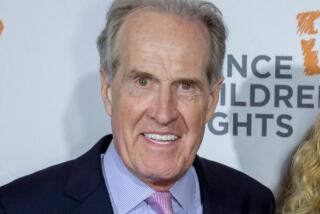Billing Trial Opens With Statements
- Share via
Two former public relations executives “lied and stole” from clients, including the Los Angeles Department of Water and Power, padding their bills with thousands of hours never worked, a federal prosecutor alleged Thursday.
“It is not a complicated case,” Assistant U.S. Atty. Cheryl Murphy told jurors in her opening statement. “It’s third-grade math and first-grade morals.”
Douglas R. Dowie, once a political fundraiser and confidant of former Mayor James K. Hahn, headed Fleishman-Hillard’s Los Angeles office.
He and his former deputy, John Stodder Jr., are on trial on charges of conspiracy and wire fraud in an alleged scheme to overbill the DWP and other clients by more than $300,000 from 2000 to 2004. They have pleaded not guilty.
Dowie’s lawyer, Thomas Holliday, told jurors that his client, “a tough old Marine,” did not know that subordinates were overbilling clients. He said the criminal activity was confined to two “rogue” employees who received deals from prosecutors in return for testifying against their old bosses.
The case is the first criminal prosecution in an ongoing state and federal “pay to play” investigation into accusations that politicians traded city contracts for campaign contributions.
Testimony from witnesses is set to begin today in a downtown Los Angeles courtroom, before U.S. District Judge Gary A. Feess.
Prosecutors have not alleged illegal campaign contributions. The case is expected to shed light on the city’s contracting practices.
Hahn and his former deputy, Troy Edwards, have been subpoenaed to testify for the defense, Stodder’s attorney, Jan Handzlik, said outside court Thursday.
In a separate civil suit, Dowie has accused Fleishman-Hillard’s top officials of firing him in January 2005 to cover up the laundering of illegal campaign contributions to Los Angeles politicians. A lawyer for the firm denied the allegations.
Handzlik, in his opening statement, told jurors that Stoddard, who joined the firm in mid-2002, was under immense pressure from Hahn’s office, which “thought they could use Fleishman-Hillard whenever they wanted to” for free public relations work for the mayor’s pet projects.
The free work pulled them off paying jobs, he said.
Much of the evidence in the case comes from 1.2 million internal e-mails turned over to prosecutors by Fleishman-Hillard, the St. Louis-based international public relations firm.
Whenever the office failed to meet its financial projections, thousands of dollars were added to the DWP bill to make up the difference, the prosecutor alleged.
“The only possible way to meet the numbers was through fraud,” Murphy said.
Former employees, she said, will testify that Dowie referred to the DWP’s $3-million-a-year contract as “a cash cow.”
Neither Dowie or Stodder, however, benefited financially from the scheme, prosecutors and defense lawyers said.
The men were indicted after seven former Fleishman-Hillard employees told The Times that they were encouraged -- sometimes explicitly told -- to falsify the hours they worked under the city contract.
Stodder’s attorney dismissed the false-billing allegations. Handzlik said the firm’s billing system was “a mess” that created “accidents, mistakes or things done for innocent reasons.”
Stodder, he said, “believed in good faith ... that the hours were worked.”
Prosecutors showed jurors projected enlargements of several key e-mails, including a January 2003 exchange between Dowie and Stodder that was the centerpiece of the criminal indictment.
In it, Dowie e-mailed Stodder to ask whether they could “pad” the monthly bill to the DWP by adding $30,000 for “ambiguous counseling for the mayor” and two DWP officials.
Stodder e-mailed back that $30,000 was “more than the system could bear,” but that a subordinate had told him that “she could slip through another $15K without incurring too much more scrutiny.”
“The defendants lied and stole from the firm’s clients,” Murphy told jurors. “They made up hours that were not actually worked.”
More to Read
Sign up for Essential California
The most important California stories and recommendations in your inbox every morning.
You may occasionally receive promotional content from the Los Angeles Times.










